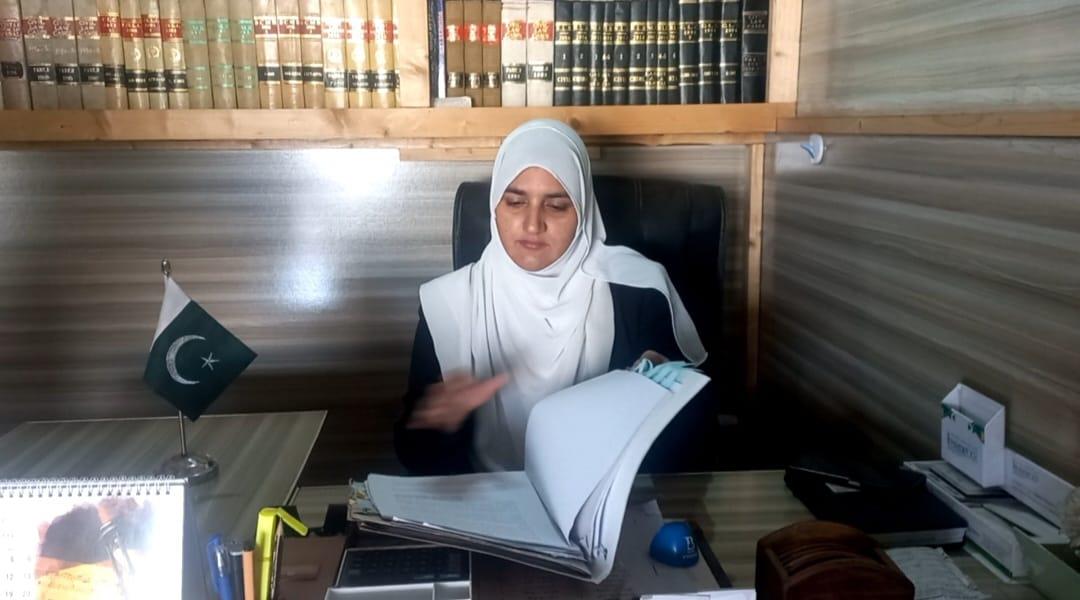
Women Lawyers Scarce In Tribal Districts, Hindering Justice For Local Women
Rabia Gul, the first female lawyer from Bajaur district, is currently practicing at both the Peshawar High Court and Bajaur courts. Speaking about the issue, she remarked that literacy rates in Khyber Pakhtunkhwa's merged districts remain low, limiting opportunities for women to enter professional fields, particularly law. According to her, most legal cases filed by women in these districts are family-related.
Barriers to Justice for Women in Tribal DistrictsAn educated woman from a tribal district, who spoke anonymously, highlighted the obstacles faced by local women.“Women in tribal districts deal with many issues, including inheritance disputes, yet rarely approach the courts. Cultural restrictions make it difficult for them to leave their homes, and they are often unaware of the legal system. Many prefer avoiding courts altogether to steer clear of the additional challenges the legal process might bring.”
Also Read: Eight Militants, Including Senior Lashkar-e-Islam Commander, Killed in Tirah Valley Clash
She also pointed out the critical lack of female lawyers in these regions. Sharing an incident, she recounted visiting a court where a woman was filing a divorce case on behalf of her daughter. The woman expressed her distress, saying,“I face daily criticism from the men in my family for hiring a male lawyer. But what can I do? There are no women lawyers here. My daughter is seeking divorce; the case must go on. If there were female lawyers in the merged districts, women would approach courts without hesitation.”
Social Norms Deter Women from Practicing LawRabia Gul mentioned a friend who holds an LLB degree and a law license but chose teaching over practicing law due to societal expectations.“Despite having a law degree, she prioritizes teaching because of local traditions. Law is already a tough profession for men; for women, it's even more challenging,” she remarked.
Gohar Ali, a lawyer from Bajaur practicing for the past four years, shared insights on the historical lack of courts in tribal areas. Under the Frontier Crimes Regulation (FCR), legal practitioners were unnecessary, but after the merger of tribal areas with Khyber Pakhtunkhwa and the establishment of courts, the need for lawyers became evident. However, he lamented that the presence of women lawyers in these districts remains negligible.
“There is a pressing need for women lawyers in tribal districts. People here are not comfortable with the idea of women seeking help from male lawyers. Moreover, women cannot articulate their issues before male lawyers as effectively as they can before female ones,” Gohar explained. He added that family-related cases, often involving sensitive matters, would be better handled by female lawyers. Gohar expressed optimism that the number of women lawyers practicing in these areas would increase in the coming years, easing access to justice for local women.
Women Lawyers: A Minority NationwideAccording to the Law and Justice Commission of Pakistan, there are over 230,000 registered lawyers in the country, but only 40,000 are women. In Khyber Pakhtunkhwa, 22,000 lawyers are currently practicing, out of which approximately 3,200 are women. In the merged districts, however, only 25 women lawyers are actively practicing.
Initiatives to Empower Women LawyersSadiq Ali, Vice Chairman of the Khyber Pakhtunkhwa Bar Council, explained that steps are being taken to encourage women to enter the legal profession.“Scholarships and training have been provided to women from merged districts. So far, 160 women lawyers have been trained, and efforts to support their professional growth are ongoing,” he said. Women are assured that the working environment is safe, encouraging them to pursue law without fear.
Inspirational Figures Lead the WayDespite challenges, a few women lawyers have emerged as role models. Among them is Mehwish Mohib Kakakhel from Nowshera, who has been practicing law in Peshawar for nine years. Her work focuses on gender-based violence, harassment, family disputes, cybercrimes, inheritance, and sexual assault cases.
Mehwish, who also serves as an advisory member of the National Commission for Human Rights, highlighted her advocacy efforts. She filed a writ petition under the Domestic Violence Act, urging the formation of district-level committees to address domestic violence. The Peshawar High Court directed the Khyber Pakhtunkhwa government to report on the progress of these committees. Mehwish emphasized that these committees would provide relief to domestic violence victims, as such cases often go unreported in police stations.
She also pointed out the lack of public facilities for women, such as restrooms, and successfully advocated for their inclusion in public spaces.
Mehwish acknowledged the struggles women lawyers face, including harassment and the absence of reserved quotas in bar councils. She has collaborated with the Provincial Ombudsman to establish a committee where women lawyers can report harassment incidents.“Bar councils and associations should provide women lawyers with financial incentives to encourage them to stay in the profession,” she suggested.
A Beacon of HopeWhile systemic challenges persist, occasional victories inspire hope. Recently, a woman in Bajaur won a six-year legal battle for her inheritance rights, setting an example for others hesitant to approach courts. Such cases demonstrate the importance of representation and access to justice for women in tribal districts.

Legal Disclaimer:
MENAFN provides the information “as is” without warranty of any kind. We do not accept any responsibility or liability for the accuracy, content, images, videos, licenses, completeness, legality, or reliability of the information contained in this article. If you have any complaints or copyright issues related to this article, kindly contact the provider above.






















Comments
No comment